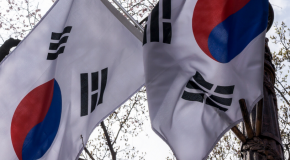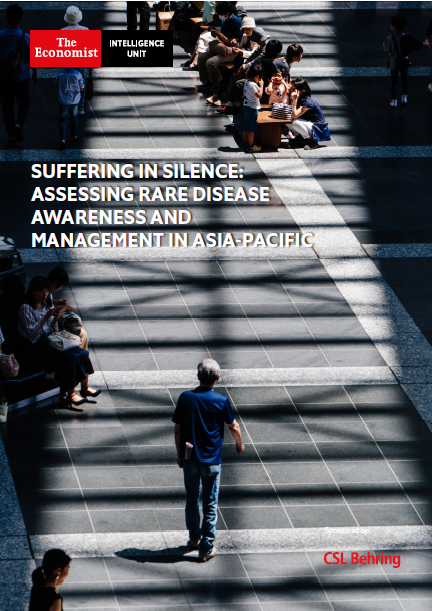Healthcare perspectives from The Economist Intelligence Unit
Two out of three rare disease patients in Asia-Pacific do not receive the best-available care, according to an Economist Intelligence Unit survey
Related content

Suffering in silence: Assessing rare disease awareness and management in As...
As the region begins to get to grips with rare diseases, it will need to address significant challenges, some of which are still emerging. Health and social systems are making progress in many of these areas, but finding solutions remains a work in progress.
This Economist Intelligence Unit study, sponsored by CSL Behring, looks at the nature of the rare disease challenge in the region, how prepared five of its economies are to face it, and reviews the initiatives aiming to provide better care. It draws on a substantial survey of over 500 clinicians, interviews with 16 academic, medical, government and patient experts, and extensive desk research.
In November-December 2019, The Economist Intelligence Unit surveyed 503 healthcare professionals across five Asia-Pacific markets to gauge their understanding of rare diseases and identify the challenges faced by national health systems. Respondents comprised currently practicing specialist physicians (n=172), general practitioners (n=229), nurses (n=40) and pharmacists (n=62). Markets included were Australia (n=103), China (n=100), Japan (n=100), South Korea (n=100) and Taiwan (n=100).
In addition, in-depth contextualising interviews were conducted with 16 expert representatives of clinical practice and patient organisations to inform our research programme and this report. Our sincerest thanks go to the following for their time and insight:
Takeya Adachi, program officer, Agency for Medical Research and Development, Japan Younjhin Ahn, Division of Rare Diseases, Korean National Institute of Health Centre for Biomedical Sciences, South Korea Matthew Bellgard, professor and director of eResearch, Queensland University of Technology, Australia and chair of the Asia Pacific Economic Cooperation (APEC) Rare Disease Network, Australia Gareth Baynam, clinical geneticist and director of the Undiagnosed Diseases Program Genetic Services of Western Australia, Australia Dong Dong, research assistant professor, Chinese University of Hong Kong, Hong Kong SAR Elizabeth Elliott, professor of Paediatrics and Child Health, University of Sydney, Australia Kevin Huang, founder, Chinese Organization for Rare Disorders, China Ritu Jain, president, Asia-Pacific Alliance of Rare Disease Organisation, Singapore Sonoko Misawa, associate professor, Chiba University Graduate School of Medicine, Japan Yukiko Nishimura, founder and president, NPO ASrid (Advocacy Service for Rare and Intractable Diseases’ Multi-Stakeholders in Japan) Min-Chieh Tseng, co-founder, Taiwan Foundation for Rare Diseases, Taiwan Gregory Vijayendran, chair, Rainbow Across Borders Richard Vines, chair, Rare Cancers Australia, Australia Jiaan-Der Wang, director of the Centre for Rare Diseases and Haemophilia, Taichung Veterans General Hospital, Taiwan Yi’ou Wang, secretary-general, Illness Challenge Foundation, China Chao-Chun Wu, deputy director general, Health Promotion Administration TaiwanThis research project was sponsored by CSL Behring. This report was written by Paul Kielstra and edited by Jesse Quigley Jones of The Economist Intelligence Unit.
Other language versions:
Snapshots:
Australia | China | Japan | Korea | Taiwan
无声的苦难:中国大陆罕见病的认知与管理评估
日本における希少疾患の現状: 認知度・QoL向上に向けた課題と取り組み
침묵 속의 고통: 한국의 희귀질환 인 식 및 관리현황 평가
無聲的苦難:評估台灣對於罕見疾病之認知與管理
Video highlights:
English | Simplified Chinese | Japanese | Korean | Traditional Chinese

Video | Suffering in silence report highlights
Suffering in Silence: Assessing rare-diseases awareness and management in Asia-Pacific
Full reports:
Snapshots:
Australia | China | Japan | Korea | Taiwan
无声的苦难:中国大陆罕见病的认知与管理评估
日本における希少疾患の現状: 認知度・QoL向上に向けた課題と取り組み
침묵 속의 고통: 한국의 희귀질환 인 식 및 관리현황 평가
無聲的苦難:評估台灣對於罕見疾病之認知與管理
Video highlights:
English | Simplified Chinese | Japanese | Korean | Traditional Chinese

Suffering in silence: Assessing rare disease awareness and management in Au...
In November-December 2019, The Economist Intelligence Unit surveyed 103 practising healthcare professionals from Australia, as part of an Asia-Pacific analysis of understanding and challenges faced in managing rare diseases.
Our survey respondents from Australia comprised general practitioners or primary care physicians (45.5%), specialist physicians (34.2%), nurses (8.0%) and pharmacists (12.3%). Respondents predominately worked in private (49.7%) and public or teaching healthcare institutions (46.5%).
Full reports:
Snapshots:
Australia | China | Japan | Korea | Taiwan
无声的苦难:中国大陆罕见病的认知与管理评估
日本における希少疾患の現状: 認知度・QoL向上に向けた課題と取り組み
침묵 속의 고통: 한국의 희귀질환 인 식 및 관리현황 평가
無聲的苦難:評估台灣對於罕見疾病之認知與管理
Video highlights:
English | Simplified Chinese | Japanese | Korean | Traditional Chinese
G20 countries are not prepared for the needs of ageing populations, according to new research from the Economist Intelligence Unit
Related content

The Cost of Silence: Cardiovascular disease in Asia
The Cost of Silence: Cardiovascular disease in Asia is a report by The Economist Intelligence Unit and EIU Healthcare. It provides a study of the economic impact of CVD risk factors on the following Asian markets: China, Australia, Hong Kong, Japan, Singapore, South Korea, Taiwan and Thailand.
Specifically, the study captures the cost of ischaemic heart disease (IHD) and stroke. IHD, also called coronary heart disease (CHD) or coronary artery disease, is the term given to heart problems caused by narrowed heart (coronary) arteries that supply blood to the heart muscle, which can lead to stable angina, unstable angina, myocardial infarctions or heart attacks, and sudden cardiac death. Stroke is characterised by the sudden loss of blood circulation to an area of the brain due to blockage of brain vessels, or a haemorrhage or blood clot.
This study further combines an evidence review of existing research on CVDs and primary research in the form of expert interviews.
Key findings of the report are as follow:
The rising incidence of CVD poses a substantial challenge to Asia-Pacific markets The four main modifiable cardiovascular risk factors pose a communications challenge for governments and health agencies. Hypertension is the risk factor that contributes the highest cost. The costs of CVDs are not fixed. Greater awareness and policymaker attention can substantially reduce CVD costs as many obstacles and corresponding solutions have been identified as effective. Policy options for primary prevention include choice “nudges”. Effective secondary prevention can also significantly affect costs and outcomes.
The cost of inaction
The cost of inaction: Recognising the value at risk from climate change is a report by The Economist Intelligence Unit (The EIU). This research depicts the scope of assets at risk from climate change from the present to 2100. This innovative achievement draws on a modelling endeavour that combines The EIU’s long-term forecasts with a nuanced, integrated assessment model provided by Vivid Economics. The full methodology can be found in the appendix to this report which can be downloaded here for free. This white paper further discusses the possible consequences of climate change as well as how both investors and governments are measuring and responding to climate-related risks. The findings of this paper are based on detailed modelling, extensive desk research and interviews with a range of experts, conducted by The Economist Intelligence Unit.
To estimate the effect of climate change to 2100 on the changing stock of manageable financial assets, The Economist Intelligence Unit (The EIU) and Vivid Economics have used a leading, peer-reviewed forecasting model of the impact of climate change on the economy, the DICE (Dynamic Integrated Climate-Economy) model. DICE is one of a small number of integrated assessment models (IAMs) that have been built to estimate the economic cost of future climate change. These models link economic growth, greenhouse gas emissions, climate change and the damages from climate change back on the economy, and they do so in an integrated, consistent framework. They are typically built by adding a model of climate change to an existing framework for modelling the macroeconomy, with carbon emissions and climate damages providing the primary links between the two. DICE is the most popular of these models, having been used and cited in thousands of academic studies over nearly three decades.
The traditional purpose of IAMs has been to estimate the size of the climate change externality—the social cost of greenhouse gas emissions—in order to inform policymakers in setting emission targets or carbon prices. A famous example of such an exercise is the Stern Review, which estimated the present value of the future social costs of climate change to be equivalent to 5-20% of global GDP. The US Environmental Protection Agency has also recently used a suite of IAMs, including DICE, to determine the social costs of carbon for federal regulatory impact assessments. Since the value of financial assets is intrinsically linked to the performance of the economy, the innovation of this study is to use the DICE model to estimate the impact of climate change on financial assets instead.
This modelling recognises that, since the present value of a portfolio of equities should be the discounted cash flow of future dividends, then in the long run—ie, over the course of a century—dividends in a diversified portfolio should grow in line with GDP, as ultimately dividends are paid for from the output of the economy. In well-functioning financial markets the same relationship with GDP growth should hold for cash flows from other kinds of assets, such as bonds. This relationship may not be observed over a relatively long time period, even decades, owing to business cycles; for example, corporate profits are currently at historical highs, while GDP growth is low. However, on average, to 2100, this relationship can be expected to hold up. The DICE model is then used to forecast the effect of climate change on GDP, and in turn on cash flows from assets. The results are for total global assets as DICE is a globally aggregated model that does not allow explicit disaggregation by asset class or by region.

Value-based healthcare in Sweden: Reaching the next level
The need to get better value from healthcare investment has never been more important as ageing populations and increasing numbers of people with multiple chronic conditions force governments to make limited financial resources go further.
These pressures, along with a greater focus on patient-centred care, have raised the profile of VBHC, especially in European healthcare systems. Sweden, with its highly comprehensive and egalitarian healthcare system, has been a leader in implementing VBHC from the beginning, a fact that was underscored in a 2016 global assessment of VBHC published by The Economist Intelligence Unit.
This paper looks at the ways in which Sweden has implemented VBHC, the areas in which it has faced obstacles and the lessons that it can teach other countries and health systems looking to improve the value of their own healthcare investments.
Video | Suffering in silence report highlights - Simplified Chinese
Related content

Suffering in silence: Assessing rare disease awareness and management in As...
As the region begins to get to grips with rare diseases, it will need to address significant challenges, some of which are still emerging. Health and social systems are making progress in many of these areas, but finding solutions remains a work in progress.
This Economist Intelligence Unit study, sponsored by CSL Behring, looks at the nature of the rare disease challenge in the region, how prepared five of its economies are to face it, and reviews the initiatives aiming to provide better care. It draws on a substantial survey of over 500 clinicians, interviews with 16 academic, medical, government and patient experts, and extensive desk research.
In November-December 2019, The Economist Intelligence Unit surveyed 503 healthcare professionals across five Asia-Pacific markets to gauge their understanding of rare diseases and identify the challenges faced by national health systems. Respondents comprised currently practicing specialist physicians (n=172), general practitioners (n=229), nurses (n=40) and pharmacists (n=62). Markets included were Australia (n=103), China (n=100), Japan (n=100), South Korea (n=100) and Taiwan (n=100).
In addition, in-depth contextualising interviews were conducted with 16 expert representatives of clinical practice and patient organisations to inform our research programme and this report. Our sincerest thanks go to the following for their time and insight:
Takeya Adachi, program officer, Agency for Medical Research and Development, Japan Younjhin Ahn, Division of Rare Diseases, Korean National Institute of Health Centre for Biomedical Sciences, South Korea Matthew Bellgard, professor and director of eResearch, Queensland University of Technology, Australia and chair of the Asia Pacific Economic Cooperation (APEC) Rare Disease Network, Australia Gareth Baynam, clinical geneticist and director of the Undiagnosed Diseases Program Genetic Services of Western Australia, Australia Dong Dong, research assistant professor, Chinese University of Hong Kong, Hong Kong SAR Elizabeth Elliott, professor of Paediatrics and Child Health, University of Sydney, Australia Kevin Huang, founder, Chinese Organization for Rare Disorders, China Ritu Jain, president, Asia-Pacific Alliance of Rare Disease Organisation, Singapore Sonoko Misawa, associate professor, Chiba University Graduate School of Medicine, Japan Yukiko Nishimura, founder and president, NPO ASrid (Advocacy Service for Rare and Intractable Diseases’ Multi-Stakeholders in Japan) Min-Chieh Tseng, co-founder, Taiwan Foundation for Rare Diseases, Taiwan Gregory Vijayendran, chair, Rainbow Across Borders Richard Vines, chair, Rare Cancers Australia, Australia Jiaan-Der Wang, director of the Centre for Rare Diseases and Haemophilia, Taichung Veterans General Hospital, Taiwan Yi’ou Wang, secretary-general, Illness Challenge Foundation, China Chao-Chun Wu, deputy director general, Health Promotion Administration TaiwanThis research project was sponsored by CSL Behring. This report was written by Paul Kielstra and edited by Jesse Quigley Jones of The Economist Intelligence Unit.
Other language versions:
Snapshots:
Australia | China | Japan | Korea | Taiwan
无声的苦难:中国大陆罕见病的认知与管理评估
日本における希少疾患の現状: 認知度・QoL向上に向けた課題と取り組み
침묵 속의 고통: 한국의 희귀질환 인 식 및 관리현황 평가
無聲的苦難:評估台灣對於罕見疾病之認知與管理
Video highlights:
English | Simplified Chinese | Japanese | Korean | Traditional Chinese

Suffering in silence: Assessing rare disease awareness and management in Au...
In November-December 2019, The Economist Intelligence Unit surveyed 103 practising healthcare professionals from Australia, as part of an Asia-Pacific analysis of understanding and challenges faced in managing rare diseases.
Our survey respondents from Australia comprised general practitioners or primary care physicians (45.5%), specialist physicians (34.2%), nurses (8.0%) and pharmacists (12.3%). Respondents predominately worked in private (49.7%) and public or teaching healthcare institutions (46.5%).
Full reports:
Snapshots:
Australia | China | Japan | Korea | Taiwan
无声的苦难:中国大陆罕见病的认知与管理评估
日本における希少疾患の現状: 認知度・QoL向上に向けた課題と取り組み
침묵 속의 고통: 한국의 희귀질환 인 식 및 관리현황 평가
無聲的苦難:評估台灣對於罕見疾病之認知與管理
Video highlights:
English | Simplified Chinese | Japanese | Korean | Traditional Chinese

Suffering in silence: Assessing rare disease awareness and management in So...
In November-December 2019, The Economist Intelligence Unit surveyed 100 practising healthcare professionals from South Korea, as part of an Asia-Pacific analysis of understanding and challenges faced in managing rare diseases.
Our survey respondents from South Korea comprised general practitioners or primary care physicians (45%), specialist physicians (35%), nurses (10%) and pharmacists (10%). Respondents reported working in predominantly private (58%) and public (12%) or teaching healthcare institutions (25%).
Full reports:
Snapshots:
Australia | China | Japan | Korea | Taiwan
无声的苦难:中国大陆罕见病的认知与管理评估
日本における希少疾患の現状: 認知度・QoL向上に向けた課題と取り組み
침묵 속의 고통: 한국의 희귀질환 인 식 및 관리현황 평가
無聲的苦難:評估台灣對於罕見疾病之認知與管理
Video highlights:
English | Simplified Chinese | Japanese | Korean | Traditional Chinese
Video | Suffering in silence report highlights - Korean
Related content

Suffering in silence: Assessing rare disease awareness and management in As...
As the region begins to get to grips with rare diseases, it will need to address significant challenges, some of which are still emerging. Health and social systems are making progress in many of these areas, but finding solutions remains a work in progress.
This Economist Intelligence Unit study, sponsored by CSL Behring, looks at the nature of the rare disease challenge in the region, how prepared five of its economies are to face it, and reviews the initiatives aiming to provide better care. It draws on a substantial survey of over 500 clinicians, interviews with 16 academic, medical, government and patient experts, and extensive desk research.
In November-December 2019, The Economist Intelligence Unit surveyed 503 healthcare professionals across five Asia-Pacific markets to gauge their understanding of rare diseases and identify the challenges faced by national health systems. Respondents comprised currently practicing specialist physicians (n=172), general practitioners (n=229), nurses (n=40) and pharmacists (n=62). Markets included were Australia (n=103), China (n=100), Japan (n=100), South Korea (n=100) and Taiwan (n=100).
In addition, in-depth contextualising interviews were conducted with 16 expert representatives of clinical practice and patient organisations to inform our research programme and this report. Our sincerest thanks go to the following for their time and insight:
Takeya Adachi, program officer, Agency for Medical Research and Development, Japan Younjhin Ahn, Division of Rare Diseases, Korean National Institute of Health Centre for Biomedical Sciences, South Korea Matthew Bellgard, professor and director of eResearch, Queensland University of Technology, Australia and chair of the Asia Pacific Economic Cooperation (APEC) Rare Disease Network, Australia Gareth Baynam, clinical geneticist and director of the Undiagnosed Diseases Program Genetic Services of Western Australia, Australia Dong Dong, research assistant professor, Chinese University of Hong Kong, Hong Kong SAR Elizabeth Elliott, professor of Paediatrics and Child Health, University of Sydney, Australia Kevin Huang, founder, Chinese Organization for Rare Disorders, China Ritu Jain, president, Asia-Pacific Alliance of Rare Disease Organisation, Singapore Sonoko Misawa, associate professor, Chiba University Graduate School of Medicine, Japan Yukiko Nishimura, founder and president, NPO ASrid (Advocacy Service for Rare and Intractable Diseases’ Multi-Stakeholders in Japan) Min-Chieh Tseng, co-founder, Taiwan Foundation for Rare Diseases, Taiwan Gregory Vijayendran, chair, Rainbow Across Borders Richard Vines, chair, Rare Cancers Australia, Australia Jiaan-Der Wang, director of the Centre for Rare Diseases and Haemophilia, Taichung Veterans General Hospital, Taiwan Yi’ou Wang, secretary-general, Illness Challenge Foundation, China Chao-Chun Wu, deputy director general, Health Promotion Administration TaiwanThis research project was sponsored by CSL Behring. This report was written by Paul Kielstra and edited by Jesse Quigley Jones of The Economist Intelligence Unit.
Other language versions:
Snapshots:
Australia | China | Japan | Korea | Taiwan
无声的苦难:中国大陆罕见病的认知与管理评估
日本における希少疾患の現状: 認知度・QoL向上に向けた課題と取り組み
침묵 속의 고통: 한국의 희귀질환 인 식 및 관리현황 평가
無聲的苦難:評估台灣對於罕見疾病之認知與管理
Video highlights:
English | Simplified Chinese | Japanese | Korean | Traditional Chinese

Suffering in silence: Assessing rare disease awareness and management in Ta...
In November-December 2019, The Economist Intelligence Unit surveyed 100 practising healthcare professionals from Taiwan, as part of an Asia-Pacific analysis of understanding and challenges faced in managing rare diseases.
Our survey respondents from Taiwan comprised general practitioners or primary care physicians (46%), specialist physicians (34%), nurses (10%) and pharmacists (10%). Respondents were split between private (54.0%) and public (21%) or teaching healthcare institutions (25%).
Full reports:
Snapshots:
Australia | China | Japan | Korea | Taiwan
无声的苦难:中国大陆罕见病的认知与管理评估
日本における希少疾患の現状: 認知度・QoL向上に向けた課題と取り組み
침묵 속의 고통: 한국의 희귀질환 인 식 및 관리현황 평가
無聲的苦難:評估台灣對於罕見疾病之認知與管理
Video highlights:
English | Simplified Chinese | Japanese | Korean | Traditional Chinese

Suffering in silence: Assessing rare disease awareness and management in Ja...
In November-December 2019, The Economist Intelligence Unit surveyed 100 practising healthcare professionals from Japan, as part of an Asia-Pacific analysis of understanding and challenges faced in managing rare diseases.
Our survey respondents from Japan comprised general practitioners or primary care physicians (44%), specialist physicians (35%), nurses (6%) and pharmacists (14%). The majority of respondents reported working in private (64%) and public or teaching healthcare institutions (16%).
Full reports:
Snapshots:
Australia | China | Japan | Korea | Taiwan
无声的苦难:中国大陆罕见病的认知与管理评估
日本における希少疾患の現状: 認知度・QoL向上に向けた課題と取り組み
침묵 속의 고통: 한국의 희귀질환 인 식 및 관리현황 평가
無聲的苦難:評估台灣對於罕見疾病之認知與管理
Video highlights:
English | Simplified Chinese | Japanese | Korean | Traditional Chinese
Video | Suffering in silence report highlights - Traditional Chinese
Related content

Suffering in silence: Assessing rare disease awareness and management in As...
As the region begins to get to grips with rare diseases, it will need to address significant challenges, some of which are still emerging. Health and social systems are making progress in many of these areas, but finding solutions remains a work in progress.
This Economist Intelligence Unit study, sponsored by CSL Behring, looks at the nature of the rare disease challenge in the region, how prepared five of its economies are to face it, and reviews the initiatives aiming to provide better care. It draws on a substantial survey of over 500 clinicians, interviews with 16 academic, medical, government and patient experts, and extensive desk research.
In November-December 2019, The Economist Intelligence Unit surveyed 503 healthcare professionals across five Asia-Pacific markets to gauge their understanding of rare diseases and identify the challenges faced by national health systems. Respondents comprised currently practicing specialist physicians (n=172), general practitioners (n=229), nurses (n=40) and pharmacists (n=62). Markets included were Australia (n=103), China (n=100), Japan (n=100), South Korea (n=100) and Taiwan (n=100).
In addition, in-depth contextualising interviews were conducted with 16 expert representatives of clinical practice and patient organisations to inform our research programme and this report. Our sincerest thanks go to the following for their time and insight:
Takeya Adachi, program officer, Agency for Medical Research and Development, Japan Younjhin Ahn, Division of Rare Diseases, Korean National Institute of Health Centre for Biomedical Sciences, South Korea Matthew Bellgard, professor and director of eResearch, Queensland University of Technology, Australia and chair of the Asia Pacific Economic Cooperation (APEC) Rare Disease Network, Australia Gareth Baynam, clinical geneticist and director of the Undiagnosed Diseases Program Genetic Services of Western Australia, Australia Dong Dong, research assistant professor, Chinese University of Hong Kong, Hong Kong SAR Elizabeth Elliott, professor of Paediatrics and Child Health, University of Sydney, Australia Kevin Huang, founder, Chinese Organization for Rare Disorders, China Ritu Jain, president, Asia-Pacific Alliance of Rare Disease Organisation, Singapore Sonoko Misawa, associate professor, Chiba University Graduate School of Medicine, Japan Yukiko Nishimura, founder and president, NPO ASrid (Advocacy Service for Rare and Intractable Diseases’ Multi-Stakeholders in Japan) Min-Chieh Tseng, co-founder, Taiwan Foundation for Rare Diseases, Taiwan Gregory Vijayendran, chair, Rainbow Across Borders Richard Vines, chair, Rare Cancers Australia, Australia Jiaan-Der Wang, director of the Centre for Rare Diseases and Haemophilia, Taichung Veterans General Hospital, Taiwan Yi’ou Wang, secretary-general, Illness Challenge Foundation, China Chao-Chun Wu, deputy director general, Health Promotion Administration TaiwanThis research project was sponsored by CSL Behring. This report was written by Paul Kielstra and edited by Jesse Quigley Jones of The Economist Intelligence Unit.
Other language versions:
Snapshots:
Australia | China | Japan | Korea | Taiwan
无声的苦难:中国大陆罕见病的认知与管理评估
日本における希少疾患の現状: 認知度・QoL向上に向けた課題と取り組み
침묵 속의 고통: 한국의 희귀질환 인 식 및 관리현황 평가
無聲的苦難:評估台灣對於罕見疾病之認知與管理
Video highlights:
English | Simplified Chinese | Japanese | Korean | Traditional Chinese

Suffering in silence: Assessing rare disease awareness and management in Ja...
In November-December 2019, The Economist Intelligence Unit surveyed 100 practising healthcare professionals from Japan, as part of an Asia-Pacific analysis of understanding and challenges faced in managing rare diseases.
Our survey respondents from Japan comprised general practitioners or primary care physicians (44%), specialist physicians (35%), nurses (6%) and pharmacists (14%). The majority of respondents reported working in private (64%) and public or teaching healthcare institutions (16%).
Full reports:
Snapshots:
Australia | China | Japan | Korea | Taiwan
无声的苦难:中国大陆罕见病的认知与管理评估
日本における希少疾患の現状: 認知度・QoL向上に向けた課題と取り組み
침묵 속의 고통: 한국의 희귀질환 인 식 및 관리현황 평가
無聲的苦難:評估台灣對於罕見疾病之認知與管理
Video highlights:
English | Simplified Chinese | Japanese | Korean | Traditional Chinese

Suffering in silence: Assessing rare disease awareness and management in So...
In November-December 2019, The Economist Intelligence Unit surveyed 100 practising healthcare professionals from South Korea, as part of an Asia-Pacific analysis of understanding and challenges faced in managing rare diseases.
Our survey respondents from South Korea comprised general practitioners or primary care physicians (45%), specialist physicians (35%), nurses (10%) and pharmacists (10%). Respondents reported working in predominantly private (58%) and public (12%) or teaching healthcare institutions (25%).
Full reports:
Snapshots:
Australia | China | Japan | Korea | Taiwan
无声的苦难:中国大陆罕见病的认知与管理评估
日本における希少疾患の現状: 認知度・QoL向上に向けた課題と取り組み
침묵 속의 고통: 한국의 희귀질환 인 식 및 관리현황 평가
無聲的苦難:評估台灣對於罕見疾病之認知與管理
Video highlights:
English | Simplified Chinese | Japanese | Korean | Traditional Chinese
Video | Suffering in silence report highlights - Japanese
Related content

Suffering in silence: Assessing rare disease awareness and management in As...
As the region begins to get to grips with rare diseases, it will need to address significant challenges, some of which are still emerging. Health and social systems are making progress in many of these areas, but finding solutions remains a work in progress.
This Economist Intelligence Unit study, sponsored by CSL Behring, looks at the nature of the rare disease challenge in the region, how prepared five of its economies are to face it, and reviews the initiatives aiming to provide better care. It draws on a substantial survey of over 500 clinicians, interviews with 16 academic, medical, government and patient experts, and extensive desk research.
In November-December 2019, The Economist Intelligence Unit surveyed 503 healthcare professionals across five Asia-Pacific markets to gauge their understanding of rare diseases and identify the challenges faced by national health systems. Respondents comprised currently practicing specialist physicians (n=172), general practitioners (n=229), nurses (n=40) and pharmacists (n=62). Markets included were Australia (n=103), China (n=100), Japan (n=100), South Korea (n=100) and Taiwan (n=100).
In addition, in-depth contextualising interviews were conducted with 16 expert representatives of clinical practice and patient organisations to inform our research programme and this report. Our sincerest thanks go to the following for their time and insight:
Takeya Adachi, program officer, Agency for Medical Research and Development, Japan Younjhin Ahn, Division of Rare Diseases, Korean National Institute of Health Centre for Biomedical Sciences, South Korea Matthew Bellgard, professor and director of eResearch, Queensland University of Technology, Australia and chair of the Asia Pacific Economic Cooperation (APEC) Rare Disease Network, Australia Gareth Baynam, clinical geneticist and director of the Undiagnosed Diseases Program Genetic Services of Western Australia, Australia Dong Dong, research assistant professor, Chinese University of Hong Kong, Hong Kong SAR Elizabeth Elliott, professor of Paediatrics and Child Health, University of Sydney, Australia Kevin Huang, founder, Chinese Organization for Rare Disorders, China Ritu Jain, president, Asia-Pacific Alliance of Rare Disease Organisation, Singapore Sonoko Misawa, associate professor, Chiba University Graduate School of Medicine, Japan Yukiko Nishimura, founder and president, NPO ASrid (Advocacy Service for Rare and Intractable Diseases’ Multi-Stakeholders in Japan) Min-Chieh Tseng, co-founder, Taiwan Foundation for Rare Diseases, Taiwan Gregory Vijayendran, chair, Rainbow Across Borders Richard Vines, chair, Rare Cancers Australia, Australia Jiaan-Der Wang, director of the Centre for Rare Diseases and Haemophilia, Taichung Veterans General Hospital, Taiwan Yi’ou Wang, secretary-general, Illness Challenge Foundation, China Chao-Chun Wu, deputy director general, Health Promotion Administration TaiwanThis research project was sponsored by CSL Behring. This report was written by Paul Kielstra and edited by Jesse Quigley Jones of The Economist Intelligence Unit.
Other language versions:
Snapshots:
Australia | China | Japan | Korea | Taiwan
无声的苦难:中国大陆罕见病的认知与管理评估
日本における希少疾患の現状: 認知度・QoL向上に向けた課題と取り組み
침묵 속의 고통: 한국의 희귀질환 인 식 및 관리현황 평가
無聲的苦難:評估台灣對於罕見疾病之認知與管理
Video highlights:
English | Simplified Chinese | Japanese | Korean | Traditional Chinese

Suffering in silence: Assessing rare disease awareness and management in Ta...
In November-December 2019, The Economist Intelligence Unit surveyed 100 practising healthcare professionals from Taiwan, as part of an Asia-Pacific analysis of understanding and challenges faced in managing rare diseases.
Our survey respondents from Taiwan comprised general practitioners or primary care physicians (46%), specialist physicians (34%), nurses (10%) and pharmacists (10%). Respondents were split between private (54.0%) and public (21%) or teaching healthcare institutions (25%).
Full reports:
Snapshots:
Australia | China | Japan | Korea | Taiwan
无声的苦难:中国大陆罕见病的认知与管理评估
日本における希少疾患の現状: 認知度・QoL向上に向けた課題と取り組み
침묵 속의 고통: 한국의 희귀질환 인 식 및 관리현황 평가
無聲的苦難:評估台灣對於罕見疾病之認知與管理
Video highlights:
English | Simplified Chinese | Japanese | Korean | Traditional Chinese

Suffering in silence: Assessing rare disease awareness and management in So...
In November-December 2019, The Economist Intelligence Unit surveyed 100 practising healthcare professionals from South Korea, as part of an Asia-Pacific analysis of understanding and challenges faced in managing rare diseases.
Our survey respondents from South Korea comprised general practitioners or primary care physicians (45%), specialist physicians (35%), nurses (10%) and pharmacists (10%). Respondents reported working in predominantly private (58%) and public (12%) or teaching healthcare institutions (25%).
Full reports:
Snapshots:
Australia | China | Japan | Korea | Taiwan
无声的苦难:中国大陆罕见病的认知与管理评估
日本における希少疾患の現状: 認知度・QoL向上に向けた課題と取り組み
침묵 속의 고통: 한국의 희귀질환 인 식 및 관리현황 평가
無聲的苦難:評估台灣對於罕見疾病之認知與管理
Video highlights:
English | Simplified Chinese | Japanese | Korean | Traditional Chinese
Video | Suffering in silence report highlights
Related content

无声的苦难:亚太地区罕见病 的认知与管理评估
随着亚太地区打算开始掌控罕见病这项社会议题,接下来将有许多重大且不断浮现的挑战需要应对。 虽然医疗与社会系统在许多层面有相当的进展,但仍有许多问题有待解决。
本次由杰特贝林CSL Behring公司赞助经济学人智库的研究将着眼于亚太地区罕见病所面临的困境、五个经济体如何准备应对这一挑战,并回顾各国相关措施如何为罕见病提供更好的医疗服务。 本报告汇整并分析了涵盖500多名临床医生的大量调查数据,以及与16位研究、医疗、政府和病友组织方面的专家的访谈,并进行了广泛的案头研究。
2019年11月至12月,经济学人智库(The Economist Intelligence Unit)访问了五个亚太市场的503名医疗专业人员,以评估他们对罕见病的了解,并找出地区医疗系统所面临的挑战。 受访者包括执业中的专科医生(n=172名)、基层医疗医师(n=229名)、护 士(n=40名)及药师(n=62名) 。 受访市场包括澳大利亚(n=103)、中国大陆(n=100)、日本(n=100)、韩国(n=100)和台湾 (n=100)。此外,我们与16名来自临床与病友组织的专家代表进行了深入情境式访谈,从而为本研究计划和这份报告提供了参考。 我们诚挚地感谢以下人员的参与及洞见:
Takeya Adachi,日本医疗研究开发机构(AMED)项目负责人 Younjhin Ahn,韩国国立生物医学科学健康中心罕见病部 Matthew Bellgard,澳大利亚昆士兰科技大学教授兼数字化研究主任、亚太经合组织(APEC)罕见病网络主席 Gareth Baynam,临床遗传学家、西澳大利亚未诊断疾病计划基因服务主任 董咚,香港中文大学研究助理教授 Elizabeth Elliott,澳大利亚悉尼大学儿科与儿童健康教授 黄如方,中国罕见病发展中心创始人 Ritu Jain,新加坡亚太罕见病组织联盟(APARDO)主席 Sonoko Misawa,日本千叶大学医学研究院副教授 Yukiko Nishimura,日本罕见病支持服务中心(NPO ASrid)创始人兼主席 曾敏杰,台湾罕见病基金会共同创办人 Gregory Vijayendran, 新加坡健康无国界联盟(RAB)主席 Richard Vines,澳大利亚罕见癌症协会主席 王建得,台湾台中荣民总医院罕见病暨血友病中心主任 王奕鸥,中国病痛挑战公益基金会秘书长 吴昭军,台湾卫生福利部国民健康署副署长本研究计划由杰特贝林(CSL Behring)公司赞助。 本报告由Paul Kielstra撰写,经济学人智库的Jesse Quigley Jones 编辑。
Full reports:
Snapshots:
Australia | China | Japan | Korea | Taiwan
无声的苦难:中国大陆罕见病的认知与管理评估
日本における希少疾患の現状: 認知度・QoL向上に向けた課題と取り組み
침묵 속의 고통: 한국의 희귀질환 인 식 및 관리현황 평가
無聲的苦難:評估台灣對於罕見疾病之認知與管理
Video highlights:
English | Simplified Chinese | Japanese | Korean | Traditional Chinese

アジアにおける希少疾患: 認知度・QoL向上に向けた 課題と取り組み
そうした中で域内諸国は希少疾患がもたらす新旧様々な問題に直面している。医療・社会制度改革を通じた問題への対応が進んでいるものの、依然として効果的対策の模索が続く分野も多い。
ザ・エコノミスト・インテリジェンス・ユニット(EIU)がCSL ベーリングの協賛の下で作成した本報告書では、アジア太平洋地域5 カ国が希少疾患の分野で直面する課題と対応、診療体制の改革に向けた取り組みについて検証する。本報告書の作成に当たっては、医療関係者500名以上を対象としたアンケート調査、学術機関・医療機関・政府関係者・エキスパート患者16名に対する聞き取り調査、そして詳細にわたるデスクリサーチが実施された。
本報告書の作成にあたり、ザ・エコノミスト・インテリジェンス・ユニット(EIU)はアジア太平洋地域5 カ国の医療関係者503名を対象とするアンケート調査を2019 年11 〜12 月にかけて実施した。その目的は、希少疾患の認知レベルを理解し、各国政府が直面する課題を検証することだ。調査対象者の内訳は、専門医172 名、一般開業医229 名、看護師40 名、薬剤師62 名(いずれも現職)。国別の内訳は、オーストラリア103 名、中国100 名、日本100 名、韓国100 名、台湾100 名となっている。
また今回の調査では、医療者・患者団体関係者16 名を対象として、詳細にわたる聞き取り調査も実施した。ご協力をいただいた下記の皆様(アルファベット順に掲載・敬称略)には、この場を借りて御礼申し上げます:
国立研究開発法人 日本医療研究開発機構プログラムオフィサー 足立剛也 韓国国立生物医学医療センター希少疾患部門 Younjhin Ahn クイーンズランド工科大学eResearch 学部 ディレクターAPEC 希少疾患ネットワーク 議長Matthew Bellgard 西オーストラリア遺伝子検査サービスセンター未診断疾患プログラム担当ディレクターGareth Baynam 香港中文大学 準教授 Dong Dong シドニー大学小児科学・児童健康学担当教授Elizabeth Elliott 中国希少疾患協会 創立者 Kevin Huang アジア太平洋希少疾患連合理事長 Ritu Jain 千葉大学医学部附属病院脳神経内科 准教授 三澤園子 特定非営利活動法人 ASrid理事 西村由希子 台湾希少疾患基金共同創立者 Min-Chieh Tseng Rainbow Across Borders議長 Gregory Vijayendran Rare Cancers Australia理事長 Richard Vines 台中栄民総医院希少疾患・血友病センター ディレクターJiaan-Der Wang 疾病挑戦基金 事務局長 Yi'ou Wang 台湾健康増進部 事務次長 Chao-Chun Wu本調査プロジェクトはCSL ベーリングの協賛の下で実施された。報告書の執筆はPaul Kielstra、編集はEIU のJesse Quigley Jones が担当している。
Full reports:
Snapshots:
Australia | China | Japan | Korea | Taiwan
无声的苦难:中国大陆罕见病的认知与管理评估
日本における希少疾患の現状: 認知度・QoL向上に向けた課題と取り組み
침묵 속의 고통: 한국의 희귀질환 인 식 및 관리현황 평가
無聲的苦難:評估台灣對於罕見疾病之認知與管理
Video highlights:
English | Simplified Chinese | Japanese | Korean | Traditional Chinese

침묵 속의 고통: 아시아태평양 지 역내 희귀질환 인지도 및 질병관 리 현황 평가
희귀질환에 대한 이해와 함께 아태지역국가들은 중대한 과제들을 해결해야 하며 일부과제들은 아직도 부상 중이다. 많은 아태국가들의 보건사회제도가 발전하고 있지만해결책을 모색하는 과정은 아직도 진행 중이다
The Economist Intelligence Unit 의 이번보고서는 CSL Behring 의 후원으로 아태지역에서의 희귀질환의 양상을 살펴보고, 다섯아태 국가의 희귀질환 대응 수준 및 환자진료개선을 위한 정책들을 검토한다. 본 보고서는500 명 이상의 임상가, 16 명의 학계, 의료계, 정부, 환자 전문가들을 대상으로 한 설문조사와 광범위한 자료조사를 토대로작성되었다.
2019 년 11,12 월에 걸쳐 EIU 는 아시아태평양 지역에서의 희귀질환에 대한이해수준과 의료제도 차원의 과제를파악하기 위해 지역내 다섯 국가의 503 명의의료 전문가들을 대상으로 설문조사를실시했다. 설문 참가자들은 현직 전문의172 명, 일반의 229 명, 간호사 40 명, 약사62 명으로서, 국가별 분포는 호주 103 명,중국 100 명, 일본 100 명, 한국 100 명, 대만100 명과 같다.이와 더불어 16 명의 임상 전문가 및 환자단체 대표들과 자문/ 심층 인터뷰를 실시하였다. 지면을 빌어 아래의 전문가/대표들의 시간과 고견에 심심한 감사의 말씀을 전한다:
Takeya Adachi, 일본 의학연구개발소프로그램 담당 안윤진,한국 국립보건연구원생명의과학센터 난치성질환과 Matthew Bellgard, 호주 퀸즐랜드공과대학교 교수 및 전자연구소장, 아시아태평양경제협력체 (APEC) 희귀질환네트워크 의장 Gareth Baynam, 호주 웨스턴오스트레일리아 주 미진단 질환프로그램 유전학 서비스 과장 및 임상유전학 전문가 Dong Dong, 홍콩 특별자치구중문대학교 연구조교수 Elizabeth Elliott, 호주 시드니 대학교소아 청소년과 교수 Kevin Huang, 중국 희귀질환연합 창립자 Ritu Jain,싱가포르 아시아태평양 희귀질환연합 대표 Sonoko Misawa, 일본 지바대학교의과대학원 부교수 Yukiko Nishimura, NPO ASrid (일본희귀난치성 질환 이해관계자 권리증진서비스)창립 대표 Min-Chieh Tseng, 대만 희귀질환재단공동설립자 Gregory Vijayendran, Rainbow Across Borders대표 Richard Vines, 호주 Rare Cancers Australia 대표 Jiaan-Der Wang, 대만 타이충 보훈병원희귀질환 및 혈우병 센터장 Yi’ou Wang, Illness Challenge Foundation사무국장 Chao-Chun Wu, 대만 건강증진청 사무차장본 연구는CSL Behring사의 후원으로이루어졌으며 보고서 작성은 Paul Kielstra (EIU), 편집은 Jesse Quigley Jones(EIU)가 담당하였다.
Full reports:
Snapshots:
Australia | China | Japan | Korea | Taiwan
无声的苦难:中国大陆罕见病的认知与管理评估
日本における希少疾患の現状: 認知度・QoL向上に向けた課題と取り組み
침묵 속의 고통: 한국의 희귀질환 인 식 및 관리현황 평가
無聲的苦難:評估台灣對於罕見疾病之認知與管理
Video highlights:
English | Simplified Chinese | Japanese | Korean | Traditional Chinese
無聲的苦難:評估台灣對於罕見疾病之認知與管理
在2019年11月至12月期間,經濟學人智庫調查了100名台灣的醫療專業人員,作為亞太地區分析罕見疾病認知與面臨的挑戰的一部分。
受訪者包括有家庭醫師或基層醫療醫師(44%)、專科醫師(36%)、護理師(6%)及藥師(14%)。受訪者服務單位分為私立醫院(54%)以及公立醫院(21%)或教學醫院(25%)。
Related content

Suffering in silence: Assessing rare disease awareness and management in Ja...
In November-December 2019, The Economist Intelligence Unit surveyed 100 practising healthcare professionals from Japan, as part of an Asia-Pacific analysis of understanding and challenges faced in managing rare diseases.
Our survey respondents from Japan comprised general practitioners or primary care physicians (44%), specialist physicians (35%), nurses (6%) and pharmacists (14%). The majority of respondents reported working in private (64%) and public or teaching healthcare institutions (16%).
Full reports:
Snapshots:
Australia | China | Japan | Korea | Taiwan
无声的苦难:中国大陆罕见病的认知与管理评估
日本における希少疾患の現状: 認知度・QoL向上に向けた課題と取り組み
침묵 속의 고통: 한국의 희귀질환 인 식 및 관리현황 평가
無聲的苦難:評估台灣對於罕見疾病之認知與管理
Video highlights:
English | Simplified Chinese | Japanese | Korean | Traditional Chinese

Suffering in silence: Assessing rare disease awareness and management in As...
As the region begins to get to grips with rare diseases, it will need to address significant challenges, some of which are still emerging. Health and social systems are making progress in many of these areas, but finding solutions remains a work in progress.
This Economist Intelligence Unit study, sponsored by CSL Behring, looks at the nature of the rare disease challenge in the region, how prepared five of its economies are to face it, and reviews the initiatives aiming to provide better care. It draws on a substantial survey of over 500 clinicians, interviews with 16 academic, medical, government and patient experts, and extensive desk research.
In November-December 2019, The Economist Intelligence Unit surveyed 503 healthcare professionals across five Asia-Pacific markets to gauge their understanding of rare diseases and identify the challenges faced by national health systems. Respondents comprised currently practicing specialist physicians (n=172), general practitioners (n=229), nurses (n=40) and pharmacists (n=62). Markets included were Australia (n=103), China (n=100), Japan (n=100), South Korea (n=100) and Taiwan (n=100).
In addition, in-depth contextualising interviews were conducted with 16 expert representatives of clinical practice and patient organisations to inform our research programme and this report. Our sincerest thanks go to the following for their time and insight:
Takeya Adachi, program officer, Agency for Medical Research and Development, Japan Younjhin Ahn, Division of Rare Diseases, Korean National Institute of Health Centre for Biomedical Sciences, South Korea Matthew Bellgard, professor and director of eResearch, Queensland University of Technology, Australia and chair of the Asia Pacific Economic Cooperation (APEC) Rare Disease Network, Australia Gareth Baynam, clinical geneticist and director of the Undiagnosed Diseases Program Genetic Services of Western Australia, Australia Dong Dong, research assistant professor, Chinese University of Hong Kong, Hong Kong SAR Elizabeth Elliott, professor of Paediatrics and Child Health, University of Sydney, Australia Kevin Huang, founder, Chinese Organization for Rare Disorders, China Ritu Jain, president, Asia-Pacific Alliance of Rare Disease Organisation, Singapore Sonoko Misawa, associate professor, Chiba University Graduate School of Medicine, Japan Yukiko Nishimura, founder and president, NPO ASrid (Advocacy Service for Rare and Intractable Diseases’ Multi-Stakeholders in Japan) Min-Chieh Tseng, co-founder, Taiwan Foundation for Rare Diseases, Taiwan Gregory Vijayendran, chair, Rainbow Across Borders Richard Vines, chair, Rare Cancers Australia, Australia Jiaan-Der Wang, director of the Centre for Rare Diseases and Haemophilia, Taichung Veterans General Hospital, Taiwan Yi’ou Wang, secretary-general, Illness Challenge Foundation, China Chao-Chun Wu, deputy director general, Health Promotion Administration TaiwanThis research project was sponsored by CSL Behring. This report was written by Paul Kielstra and edited by Jesse Quigley Jones of The Economist Intelligence Unit.
Other language versions:
Snapshots:
Australia | China | Japan | Korea | Taiwan
无声的苦难:中国大陆罕见病的认知与管理评估
日本における希少疾患の現状: 認知度・QoL向上に向けた課題と取り組み
침묵 속의 고통: 한국의 희귀질환 인 식 및 관리현황 평가
無聲的苦難:評估台灣對於罕見疾病之認知與管理
Video highlights:
English | Simplified Chinese | Japanese | Korean | Traditional Chinese

Suffering in silence: Assessing rare disease awareness and management in So...
In November-December 2019, The Economist Intelligence Unit surveyed 100 practising healthcare professionals from South Korea, as part of an Asia-Pacific analysis of understanding and challenges faced in managing rare diseases.
Our survey respondents from South Korea comprised general practitioners or primary care physicians (45%), specialist physicians (35%), nurses (10%) and pharmacists (10%). Respondents reported working in predominantly private (58%) and public (12%) or teaching healthcare institutions (25%).
Full reports:
Snapshots:
Australia | China | Japan | Korea | Taiwan
无声的苦难:中国大陆罕见病的认知与管理评估
日本における希少疾患の現状: 認知度・QoL向上に向けた課題と取り組み
침묵 속의 고통: 한국의 희귀질환 인 식 및 관리현황 평가
無聲的苦難:評估台灣對於罕見疾病之認知與管理
Video highlights:
English | Simplified Chinese | Japanese | Korean | Traditional Chinese
침묵 속의 고통: 한국의 희귀질환 인 식 및 관리현황 평가
2019년 11-12월, The Economist Intelligence Unit은 아시아태평양지역내 희귀질환 인식 및 관리의 과제를분석하는 연구조사의 일환으로, 한국보건의료전문가들 100명을 대상으로설문조사를 실시했다.
한국 설문조사 참가자들은 일반의/일차의료의(45%), 전문의(35%), 간호사(10%), 약사(10%)로 구성되었다. 대부분사립병원 (58%)에 종사하였고, 나머지는국공립병원(12%)과 수련병원(25%)으로나뉘었다.
Related content

Suffering in silence: Assessing rare disease awareness and management in As...
As the region begins to get to grips with rare diseases, it will need to address significant challenges, some of which are still emerging. Health and social systems are making progress in many of these areas, but finding solutions remains a work in progress.
This Economist Intelligence Unit study, sponsored by CSL Behring, looks at the nature of the rare disease challenge in the region, how prepared five of its economies are to face it, and reviews the initiatives aiming to provide better care. It draws on a substantial survey of over 500 clinicians, interviews with 16 academic, medical, government and patient experts, and extensive desk research.
In November-December 2019, The Economist Intelligence Unit surveyed 503 healthcare professionals across five Asia-Pacific markets to gauge their understanding of rare diseases and identify the challenges faced by national health systems. Respondents comprised currently practicing specialist physicians (n=172), general practitioners (n=229), nurses (n=40) and pharmacists (n=62). Markets included were Australia (n=103), China (n=100), Japan (n=100), South Korea (n=100) and Taiwan (n=100).
In addition, in-depth contextualising interviews were conducted with 16 expert representatives of clinical practice and patient organisations to inform our research programme and this report. Our sincerest thanks go to the following for their time and insight:
Takeya Adachi, program officer, Agency for Medical Research and Development, Japan Younjhin Ahn, Division of Rare Diseases, Korean National Institute of Health Centre for Biomedical Sciences, South Korea Matthew Bellgard, professor and director of eResearch, Queensland University of Technology, Australia and chair of the Asia Pacific Economic Cooperation (APEC) Rare Disease Network, Australia Gareth Baynam, clinical geneticist and director of the Undiagnosed Diseases Program Genetic Services of Western Australia, Australia Dong Dong, research assistant professor, Chinese University of Hong Kong, Hong Kong SAR Elizabeth Elliott, professor of Paediatrics and Child Health, University of Sydney, Australia Kevin Huang, founder, Chinese Organization for Rare Disorders, China Ritu Jain, president, Asia-Pacific Alliance of Rare Disease Organisation, Singapore Sonoko Misawa, associate professor, Chiba University Graduate School of Medicine, Japan Yukiko Nishimura, founder and president, NPO ASrid (Advocacy Service for Rare and Intractable Diseases’ Multi-Stakeholders in Japan) Min-Chieh Tseng, co-founder, Taiwan Foundation for Rare Diseases, Taiwan Gregory Vijayendran, chair, Rainbow Across Borders Richard Vines, chair, Rare Cancers Australia, Australia Jiaan-Der Wang, director of the Centre for Rare Diseases and Haemophilia, Taichung Veterans General Hospital, Taiwan Yi’ou Wang, secretary-general, Illness Challenge Foundation, China Chao-Chun Wu, deputy director general, Health Promotion Administration TaiwanThis research project was sponsored by CSL Behring. This report was written by Paul Kielstra and edited by Jesse Quigley Jones of The Economist Intelligence Unit.
Other language versions:
Snapshots:
Australia | China | Japan | Korea | Taiwan
无声的苦难:中国大陆罕见病的认知与管理评估
日本における希少疾患の現状: 認知度・QoL向上に向けた課題と取り組み
침묵 속의 고통: 한국의 희귀질환 인 식 및 관리현황 평가
無聲的苦難:評估台灣對於罕見疾病之認知與管理
Video highlights:
English | Simplified Chinese | Japanese | Korean | Traditional Chinese

Suffering in silence: Assessing rare disease awareness and management in Ta...
In November-December 2019, The Economist Intelligence Unit surveyed 100 practising healthcare professionals from Taiwan, as part of an Asia-Pacific analysis of understanding and challenges faced in managing rare diseases.
Our survey respondents from Taiwan comprised general practitioners or primary care physicians (46%), specialist physicians (34%), nurses (10%) and pharmacists (10%). Respondents were split between private (54.0%) and public (21%) or teaching healthcare institutions (25%).
Full reports:
Snapshots:
Australia | China | Japan | Korea | Taiwan
无声的苦难:中国大陆罕见病的认知与管理评估
日本における希少疾患の現状: 認知度・QoL向上に向けた課題と取り組み
침묵 속의 고통: 한국의 희귀질환 인 식 및 관리현황 평가
無聲的苦難:評估台灣對於罕見疾病之認知與管理
Video highlights:
English | Simplified Chinese | Japanese | Korean | Traditional Chinese

Suffering in silence: Assessing rare disease awareness and management in Ja...
In November-December 2019, The Economist Intelligence Unit surveyed 100 practising healthcare professionals from Japan, as part of an Asia-Pacific analysis of understanding and challenges faced in managing rare diseases.
Our survey respondents from Japan comprised general practitioners or primary care physicians (44%), specialist physicians (35%), nurses (6%) and pharmacists (14%). The majority of respondents reported working in private (64%) and public or teaching healthcare institutions (16%).
Full reports:
Snapshots:
Australia | China | Japan | Korea | Taiwan
无声的苦难:中国大陆罕见病的认知与管理评估
日本における希少疾患の現状: 認知度・QoL向上に向けた課題と取り組み
침묵 속의 고통: 한국의 희귀질환 인 식 및 관리현황 평가
無聲的苦難:評估台灣對於罕見疾病之認知與管理
Video highlights:
English | Simplified Chinese | Japanese | Korean | Traditional Chinese
日本における希少疾患の現状: 認知度・QoL向上に向けた課題と取り組み
Related content

Suffering in silence: Assessing rare disease awareness and management in As...
As the region begins to get to grips with rare diseases, it will need to address significant challenges, some of which are still emerging. Health and social systems are making progress in many of these areas, but finding solutions remains a work in progress.
This Economist Intelligence Unit study, sponsored by CSL Behring, looks at the nature of the rare disease challenge in the region, how prepared five of its economies are to face it, and reviews the initiatives aiming to provide better care. It draws on a substantial survey of over 500 clinicians, interviews with 16 academic, medical, government and patient experts, and extensive desk research.
In November-December 2019, The Economist Intelligence Unit surveyed 503 healthcare professionals across five Asia-Pacific markets to gauge their understanding of rare diseases and identify the challenges faced by national health systems. Respondents comprised currently practicing specialist physicians (n=172), general practitioners (n=229), nurses (n=40) and pharmacists (n=62). Markets included were Australia (n=103), China (n=100), Japan (n=100), South Korea (n=100) and Taiwan (n=100).
In addition, in-depth contextualising interviews were conducted with 16 expert representatives of clinical practice and patient organisations to inform our research programme and this report. Our sincerest thanks go to the following for their time and insight:
Takeya Adachi, program officer, Agency for Medical Research and Development, Japan Younjhin Ahn, Division of Rare Diseases, Korean National Institute of Health Centre for Biomedical Sciences, South Korea Matthew Bellgard, professor and director of eResearch, Queensland University of Technology, Australia and chair of the Asia Pacific Economic Cooperation (APEC) Rare Disease Network, Australia Gareth Baynam, clinical geneticist and director of the Undiagnosed Diseases Program Genetic Services of Western Australia, Australia Dong Dong, research assistant professor, Chinese University of Hong Kong, Hong Kong SAR Elizabeth Elliott, professor of Paediatrics and Child Health, University of Sydney, Australia Kevin Huang, founder, Chinese Organization for Rare Disorders, China Ritu Jain, president, Asia-Pacific Alliance of Rare Disease Organisation, Singapore Sonoko Misawa, associate professor, Chiba University Graduate School of Medicine, Japan Yukiko Nishimura, founder and president, NPO ASrid (Advocacy Service for Rare and Intractable Diseases’ Multi-Stakeholders in Japan) Min-Chieh Tseng, co-founder, Taiwan Foundation for Rare Diseases, Taiwan Gregory Vijayendran, chair, Rainbow Across Borders Richard Vines, chair, Rare Cancers Australia, Australia Jiaan-Der Wang, director of the Centre for Rare Diseases and Haemophilia, Taichung Veterans General Hospital, Taiwan Yi’ou Wang, secretary-general, Illness Challenge Foundation, China Chao-Chun Wu, deputy director general, Health Promotion Administration TaiwanThis research project was sponsored by CSL Behring. This report was written by Paul Kielstra and edited by Jesse Quigley Jones of The Economist Intelligence Unit.
Other language versions:
Snapshots:
Australia | China | Japan | Korea | Taiwan
无声的苦难:中国大陆罕见病的认知与管理评估
日本における希少疾患の現状: 認知度・QoL向上に向けた課題と取り組み
침묵 속의 고통: 한국의 희귀질환 인 식 및 관리현황 평가
無聲的苦難:評估台灣對於罕見疾病之認知與管理
Video highlights:
English | Simplified Chinese | Japanese | Korean | Traditional Chinese

Suffering in silence: Assessing rare disease awareness and management in Au...
In November-December 2019, The Economist Intelligence Unit surveyed 103 practising healthcare professionals from Australia, as part of an Asia-Pacific analysis of understanding and challenges faced in managing rare diseases.
Our survey respondents from Australia comprised general practitioners or primary care physicians (45.5%), specialist physicians (34.2%), nurses (8.0%) and pharmacists (12.3%). Respondents predominately worked in private (49.7%) and public or teaching healthcare institutions (46.5%).
Full reports:
Snapshots:
Australia | China | Japan | Korea | Taiwan
无声的苦难:中国大陆罕见病的认知与管理评估
日本における希少疾患の現状: 認知度・QoL向上に向けた課題と取り組み
침묵 속의 고통: 한국의 희귀질환 인 식 및 관리현황 평가
無聲的苦難:評估台灣對於罕見疾病之認知與管理
Video highlights:
English | Simplified Chinese | Japanese | Korean | Traditional Chinese

Suffering in silence: Assessing rare disease awareness and management in So...
In November-December 2019, The Economist Intelligence Unit surveyed 100 practising healthcare professionals from South Korea, as part of an Asia-Pacific analysis of understanding and challenges faced in managing rare diseases.
Our survey respondents from South Korea comprised general practitioners or primary care physicians (45%), specialist physicians (35%), nurses (10%) and pharmacists (10%). Respondents reported working in predominantly private (58%) and public (12%) or teaching healthcare institutions (25%).
Full reports:
Snapshots:
Australia | China | Japan | Korea | Taiwan
无声的苦难:中国大陆罕见病的认知与管理评估
日本における希少疾患の現状: 認知度・QoL向上に向けた課題と取り組み
침묵 속의 고통: 한국의 희귀질환 인 식 및 관리현황 평가
無聲的苦難:評估台灣對於罕見疾病之認知與管理
Video highlights:
English | Simplified Chinese | Japanese | Korean | Traditional Chinese




